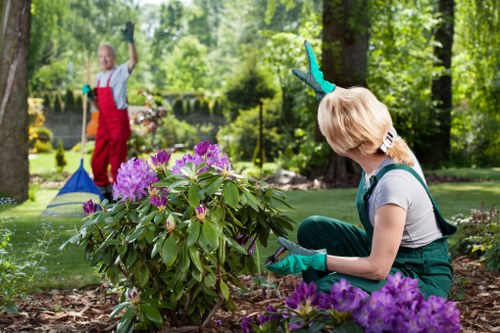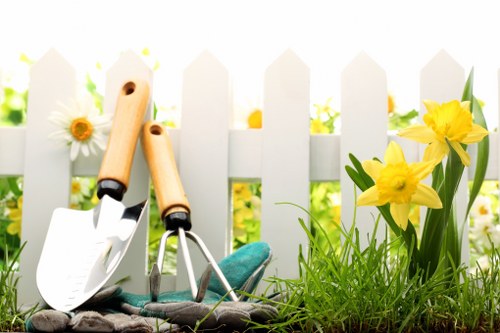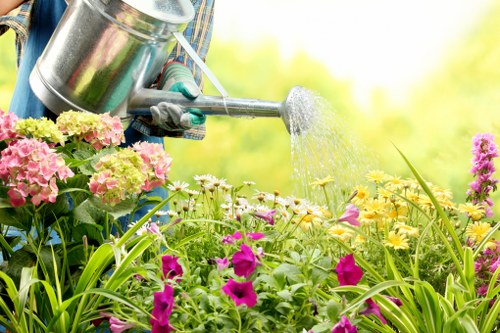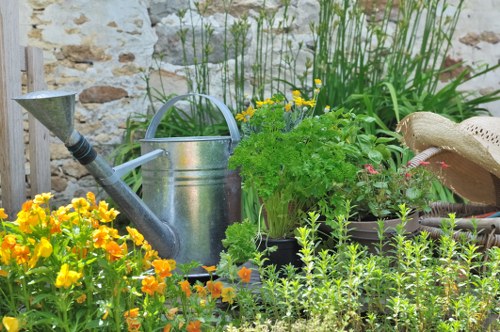Garden Maintenance in Dulwich
Introduction to Garden Maintenance

Maintaining a beautiful garden in Dulwich requires dedication, knowledge, and the right techniques. Whether you're a seasoned gardener or a novice, understanding the fundamentals of garden maintenance is essential for creating a thriving outdoor space.
Garden maintenance encompasses a variety of tasks, from routine lawn care to specialized plant treatments. In Dulwich, the climate and soil conditions present unique challenges and opportunities for gardeners seeking to cultivate vibrant and healthy gardens.
In this comprehensive guide, we'll explore the key aspects of garden maintenance in Dulwich, providing you with practical tips and strategies to keep your garden in top shape all year round.
Seasonal Garden Care

Seasonal changes significantly impact garden maintenance routines. Adapting your care strategies to each season ensures that your plants remain healthy and resilient against weather fluctuations.
Spring Maintenance
Spring is a critical time for garden rejuvenation. Start by clearing any debris accumulated over the winter months. Prune dead branches and trim overgrown shrubs to encourage new growth.
Planting new flowers and vegetables is ideal in spring. Ensure that the soil is well-prepared by adding compost and organic matter to enhance fertility. Regular watering is essential as plants begin to grow actively.
Summer Maintenance
Summer brings intense sunlight and heat, requiring diligent watering and attention to prevent plant stress. Mulching helps retain soil moisture and suppress weeds.
Regular weeding is necessary to reduce competition for nutrients. Implementing proper pest control measures can protect your garden from common summer pests such as aphids and mites.
Autumn Maintenance
As temperatures cool, focus on preparing your garden for the winter months. Remove fallen leaves and dead plant material to prevent fungal diseases.
Planting cover crops can enrich the soil and deter erosion. Prune trees and shrubs to maintain their structure and remove any weak branches that could break under snow or ice.
Winter Maintenance
Winter is a quieter period for garden maintenance but still requires attention. Protect sensitive plants with mulch or covers to shield them from frost.
Use this time to plan for the upcoming year. Assess what worked well and identify areas for improvement in your garden maintenance routine.
Lawn Care in Dulwich

A well-maintained lawn is the cornerstone of any beautiful garden. In Dulwich, lawn care involves specific practices to ensure lush, green grass that can withstand the local climate.
Mowing Techniques
Regular mowing is essential for a healthy lawn. Aim to mow your grass to a height of about 2.5 to 3 inches. Cutting too short can stress the grass, making it more susceptible to weeds and diseases.
Ensure your mower blades are sharp to make clean cuts, reducing the risk of tearing the grass. Mow in different patterns each time to promote even growth and prevent soil compaction.
Fertilization
Fertilizing your lawn provides the necessary nutrients for growth. Use a balanced fertilizer suitable for your grass type, applying it in the spring and autumn.
Avoid over-fertilizing, as this can lead to excessive growth and increased vulnerability to pests. Organic fertilizers are an excellent choice for promoting sustainable lawn health.
Weed and Pest Control
Weeds compete with your grass for resources, so regular removal is crucial. Hand-pulling or using eco-friendly herbicides can effectively manage weed growth.
Monitor your lawn for signs of pests such as grubs or armyworms. Early detection allows for timely intervention, preventing significant damage to your turf.
Watering Practices
Proper watering is vital for maintaining a healthy lawn. Water deeply and infrequently to encourage deep root growth. Early morning is the best time to water, reducing evaporation and fungal risks.
Adjust your watering schedule based on weather conditions, ensuring your lawn receives adequate moisture without becoming waterlogged.
Pruning and Plant Care

Pruning is a fundamental aspect of garden maintenance, promoting plant health and enhancing the overall appearance of your garden.
When to Prune
Different plants require pruning at various times of the year. Generally, late winter or early spring is ideal for most shrubs and trees, allowing them to recover before the growing season.
Flowering plants may need pruning after they have bloomed to encourage new growth and maintain their shape.
Pruning Techniques
Use sharp, clean tools to make precise cuts, minimizing damage to the plant. Focus on removing dead, diseased, or crossing branches to improve air circulation and light penetration.
Maintain the natural shape of the plant, avoiding excessive cutting that can stress the foliage and inhibit growth.
Plant Selection and Care
Select plants that are well-suited to Dulwich's climate and soil conditions. Native species are often more resilient and require less maintenance.
Regularly inspect your plants for signs of stress or disease. Promptly address any issues to prevent them from spreading and causing more significant problems.
Mulching for Plant Health
Applying mulch around your plants helps retain soil moisture, regulate temperature, and suppress weed growth. Organic mulches such as bark or straw also contribute to soil fertility as they decompose.
Ensure mulch is applied in a layer about 2-3 inches thick, avoiding direct contact with plant stems to prevent rot and disease.
Soil Management

Healthy soil is the foundation of a thriving garden. Effective soil management practices in Dulwich can significantly enhance plant growth and resilience.
Soil Testing
Conduct regular soil tests to determine pH levels and nutrient content. This information helps in selecting the right amendments to improve soil health.
Adjust soil pH as needed by adding lime to raise it or sulfur to lower it, ensuring optimal conditions for your plants.
Amending Soil
Incorporate organic matter such as compost or well-rotted manure to enrich the soil. This improves soil structure, drainage, and nutrient availability.
For heavy clay soils, adding sand and organic matter can enhance drainage, while sandy soils benefit from added compost to increase water retention.
Cover Crops and Green Manure
Planting cover crops during the off-season helps prevent soil erosion, suppress weeds, and add organic matter to the soil.
Green manure crops, such as clover or rye, fix nitrogen in the soil, enhancing fertility for subsequent plantings.
Crop Rotation
Rotating crops each season reduces the risk of soil-borne diseases and pests. It also helps maintain soil fertility by alternating plant families with different nutrient requirements.
Plan your garden layout to facilitate effective crop rotation, ensuring that each area of your garden receives balanced care throughout the year.
Integrated Pest Management
Protecting your garden from pests is crucial for maintaining plant health. Integrated Pest Management (IPM) offers a sustainable approach to pest control in Dulwich gardens.
Identifying Common Pests
Familiarize yourself with the common pests that affect gardens in Dulwich, such as slugs, snails, aphids, and caterpillars.
Early identification allows for prompt action, preventing minor issues from escalating into significant infestations.
Natural Pest Control Methods
Encourage beneficial insects like ladybugs and lacewings, which prey on common garden pests. Planting a variety of flowers can attract these natural predators.
Use barriers such as nets or row covers to protect vulnerable plants from pest ingress.
Chemical Pest Control
When necessary, use chemical pesticides responsibly. Choose targeted treatments that minimize harm to beneficial insects and the surrounding environment.
Always follow the manufacturer's instructions and apply pesticides during favorable weather conditions to maximize effectiveness and reduce risks.
Preventative Measures
Maintain garden hygiene by removing plant debris and weeds that can harbor pests. Rotate crops to disrupt pest life cycles and reduce their populations.
Implementing strong, healthy plant practices enhances resilience against pest attacks, reducing the need for intensive control measures.
Garden Tools and Equipment
Having the right tools and equipment is essential for efficient garden maintenance in Dulwich. Quality tools make tasks easier and more effective.
Essential Garden Tools
Invest in essential tools such as a sturdy lawnmower, pruning shears, a hand trowel, and a garden fork. These tools cover the basic needs for most garden maintenance tasks.
Maintain your tools regularly by cleaning, sharpening, and storing them properly to extend their lifespan and ensure optimal performance.
Advanced Equipment
For larger gardens, consider investing in advanced equipment like a rototiller for soil preparation or a pressure washer for cleaning hard surfaces.
Automated irrigation systems can save time and ensure consistent watering, promoting healthier plant growth.
Safety Tips
Always prioritize safety when using garden tools and equipment. Wear appropriate protective gear, such as gloves and safety glasses, to prevent injuries.
Follow manufacturer guidelines for operating machinery, and perform regular maintenance checks to ensure everything is in working order.
Storage Solutions
Proper storage of garden tools prevents damage and makes them easily accessible. Use a dedicated shed or storage bench to keep tools organized and protected from the elements.
Clean and dry tools before storage to prevent rust and deterioration, ensuring they are ready for use in the next gardening season.
Landscape Design and Enhancement
Aesthetically pleasing landscapes not only boost the curb appeal of your property but also create a relaxing outdoor environment. Thoughtful landscape design complements garden maintenance efforts in Dulwich.
Choosing the Right Plants
Select plants that thrive in Dulwich's climate and soil conditions. Native plants are often more adaptable and require less maintenance, making them a smart choice for sustainable gardens.
Incorporate a mix of perennials, annuals, shrubs, and trees to add depth and variety to your landscape.
Creating Plant Beds and Borders
Designate specific areas for different plant types to organize your garden effectively. Plant beds and borders define spaces and make maintenance tasks more manageable.
Use edging materials such as stone, metal, or wood to create clean lines and prevent grass from encroaching into flower beds.
Pathways and Hardscaping
Incorporate pathways and hardscaping elements like patios or decks to enhance the functionality and beauty of your garden. These features provide structure and facilitate easy access to different areas.
Choose materials that complement your garden's aesthetic and are durable enough to withstand Dulwich's weather conditions.
Water Features and Lighting
Adding water features like ponds or fountains can create a tranquil ambiance in your garden. These elements also attract wildlife, adding to the garden's biodiversity.
Outdoor lighting enhances the beauty of your garden at night and improves safety by illuminating pathways and entry points.
Organic Gardening Practices
Embracing organic gardening practices promotes a healthy ecosystem and reduces reliance on chemical inputs. Organic methods are particularly beneficial in Dulwich, where environmental sustainability is a growing concern.
Composting
Composting transforms kitchen scraps and garden waste into nutrient-rich soil amendments. This practice reduces waste and improves soil fertility, enhancing plant growth.
Create a compost bin in your garden, layering green materials like vegetable scraps with brown materials like leaves and straw. Regularly turn the compost to aerate it and speed up decomposition.
Natural Fertilizers
Use natural fertilizers such as bone meal, fish emulsion, and seaweed extracts to provide essential nutrients to your plants without harming the environment.
Avoid synthetic fertilizers that can lead to soil degradation and water pollution, opting instead for eco-friendly alternatives that support long-term soil health.
Beneficial Insects and Wildlife
Encouraging beneficial insects like bees, butterflies, and predatory beetles helps maintain a balanced garden ecosystem. These insects pollinate plants and control pest populations naturally.
Provide habitats for wildlife by planting diverse species and incorporating features like birdhouses and insect hotels into your garden design.
Mulching and Weed Control
Organic mulches, such as shredded leaves or bark, improve soil structure, retain moisture, and suppress weed growth. Applying a thick layer of mulch reduces the need for frequent watering and weeding.
Regularly inspect your garden for invasive weeds and remove them manually to prevent them from taking over your desired plantings.
Sustainable Garden Maintenance
Sustainability in garden maintenance involves practices that conserve resources, protect the environment, and promote biodiversity. Implementing sustainable methods in Dulwich gardens contributes to a healthier planet.
Water Conservation
Implement water-saving techniques such as drip irrigation, rainwater harvesting, and mulching to reduce water usage in your garden.
Choose drought-tolerant plants that require less water, ensuring your garden remains lush even during dry periods.
Energy-Efficient Tools
Opt for energy-efficient gardening tools, such as electric or battery-powered equipment, to minimize your carbon footprint.
Maintain tools regularly to ensure they operate efficiently, reducing energy consumption and extending their lifespan.
Reducing Waste
Minimize garden waste by composting organic materials and recycling plant trimmings. Reuse materials like containers and pots to decrease the need for new resources.
Implement a zero-waste approach by thoughtfully planning your garden layout and plant selection to maximize space and resource utilization.
Promoting Biodiversity
Create a diverse garden ecosystem by planting a variety of species that attract different types of wildlife. Diversity enhances resilience against pests and diseases.
Incorporate native plants that support local wildlife and contribute to the overall health of the local environment.
Professional Garden Maintenance Services
While DIY garden maintenance is rewarding, enlisting professional services can ensure your garden in Dulwich receives expert care tailored to its specific needs.
Benefits of Hiring Professionals
Professional gardeners bring expertise and experience, handling complex tasks like landscape design, soil management, and pest control with efficiency.
They can provide personalized maintenance plans, ensuring your garden remains healthy and beautiful throughout the year.
Services Offered
Comprehensive garden maintenance services include regular lawn care, pruning, planting, soil testing, and seasonal clean-ups.
Specialized services such as irrigation system installation, hardscaping, and landscape lighting can enhance your garden's functionality and aesthetic appeal.
Choosing the Right Service Provider
When selecting a garden maintenance service in Dulwich, consider their experience, range of services, and customer reviews. A reputable provider should offer customized solutions to meet your garden's unique requirements.
Requesting a consultation can help assess your garden's needs and determine the best course of action for effective maintenance.
Cost Considerations
Investing in professional garden maintenance can save time and prevent costly mistakes associated with improper care. While there is an upfront cost, the long-term benefits of a well-maintained garden often outweigh the expenses.
Discuss pricing structures and service packages with potential providers to find an option that aligns with your budget and maintenance goals.
Maximizing Garden Health with Professional Help
Professional gardeners use advanced techniques and tools to enhance garden health and beauty. Their expertise ensures that your garden thrives, providing a serene and enjoyable outdoor space.
Regular professional maintenance can identify and address issues early, maintaining the integrity and appeal of your garden year-round.
Conclusion

Effective garden maintenance in Dulwich involves a combination of knowledge, routine care, and sustainable practices. By understanding the seasonal requirements, investing in the right tools, and possibly seeking professional assistance, you can cultivate a vibrant and healthy garden.
Embrace these maintenance strategies to enjoy a beautiful outdoor space that enhances your home's aesthetic and provides a relaxing environment for years to come.
Contact us today to learn more about our garden maintenance services and let us help you create the garden of your dreams in Dulwich.
